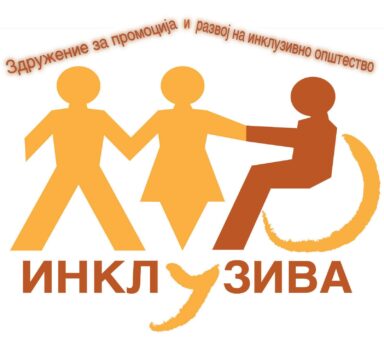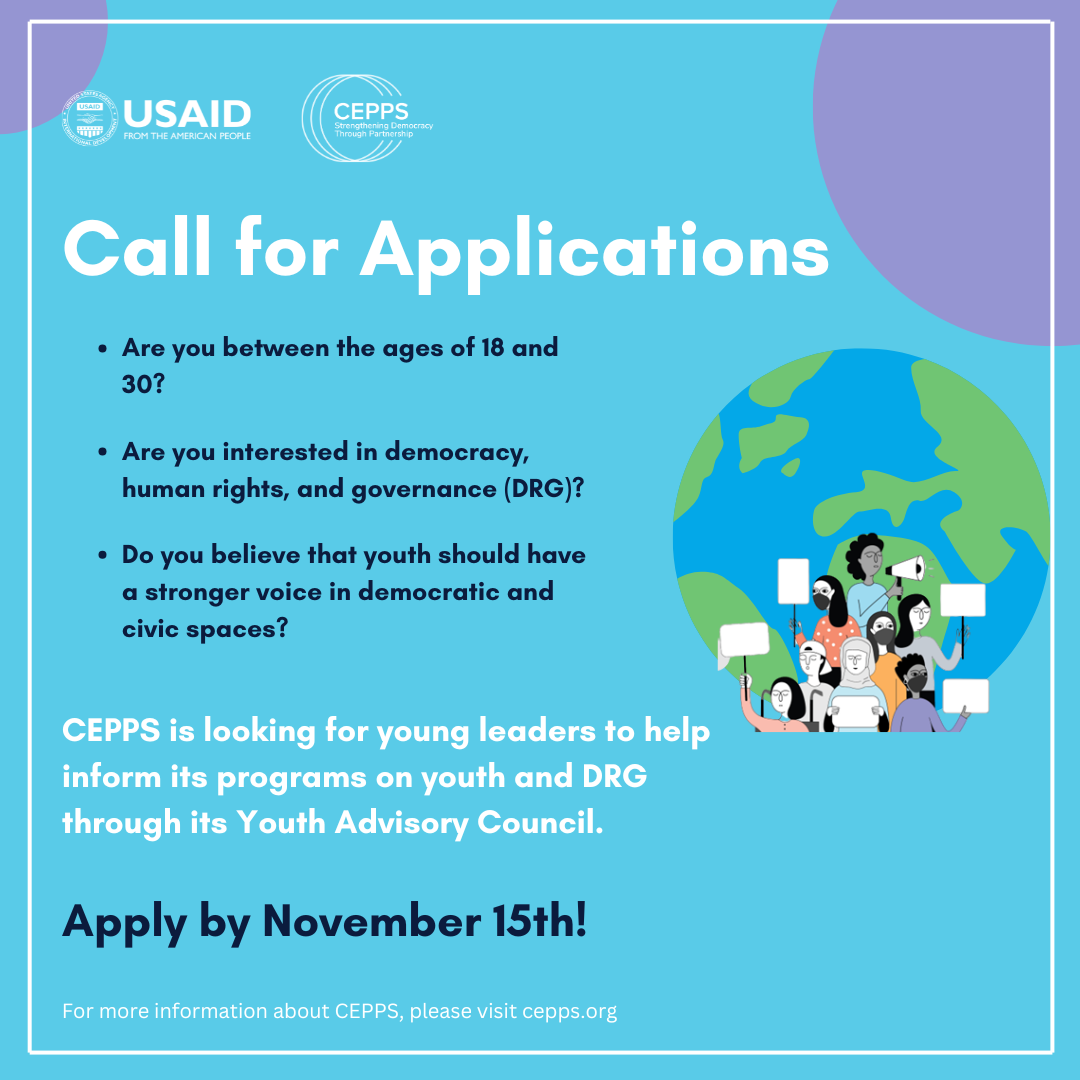Around the world, we work alongside local partners to boost their capacity to engage in a more inclusive democratic process. For example, CEPPS works with the Inkluziva in North Macedonia to create conditions for an inclusive society through activities and projects that enable people with disabilities and other vulnerable groups to have the same opportunities and human rights guarantees as everyone else.
Find Elena Chekorova’s spotlight video below:
My name is Elena Chekorova. I work for the Association for Promotion and Development of an Inclusive Society (INKLUZIVA). INKLUZIVA focuses on creating conditions for an inclusive society through activities and projects that enable people with disabilities and other traditionally underrepresented groups to have the same opportunities and human rights guarantees.

Imagine being a person using a wheelchair and there are stairs at the entrance of more than 60% of polling stations in the country and more than 80% percent of polling stations are located on the second floor with no elevator in the building. Imagine being a person who is blind and going to the polling station without assistance. In order to vote you would have to verbally tell your chosen candidate to the voter standing behind you, so he or she can circle the ballot on your behalf. Do you trust that your vote was cast as you wished? Is the secrecy of your vote violated? People who are Deaf or hard-of-hearing may not understand what politicians are saying if sign language is not provided during their speeches or debates. People with intellectual disabilities may not understand politicians because they do not use easy-to-read formats in their outreach. Websites are often not accessible for people who use screen readers, media outlets often do not use sign language interpretation, and politicians do not consult with disabled people’s organizations (DPOs) when assembling their election programs.
Stigma and prejudice toward people with disabilities is still high among election officials, political parties and the general population. For example, during the last parliamentary election there was only one person with a disability nominated as a candidate to become a Member of Parliament (MP). This candidate was low on the list, with no chance of getting a seat in Parliament. All of these challenges give us at INKLUZIVA motivation and dedication to change the landscape, as well as to enable conditions for an inclusive election environment where people with disabilities can vote independently.
For over five years, INKLUZIVA has been trying to enhance the political and electoral participation of people with disabilities in North Macedonia. Our motto is: give constructive feedback and offer partnerships for change. That is how we approached the State Election Commission (SEC) and brought them on board with our initiatives. During the CEPPS funded project, INKLUZIVA made a large impact by training 22 SEC officials and 94 members of Municipal Election Boards. From these workshops, INKLUZIVA developed a manual for organizing accessible elections, which was distributed to 200 election officials. We trained 16 representatives from 10 major political parties and developed a video for organizing accessible campaigns that reached over 7,000 people.
Today, we are seeing the effects of this training. Political parties are now working with INKLUZIVA to adapt their websites to ensure they are accessible for people with disabilities and are consulting with us about how to ensure the rights of people with disabilities within their electoral programs. These are small but important steps for people with disabilities.
In order to enable political and electoral participation, it is not only important to work with institutions, but it is also very important to work directly with people with disabilities. People with disabilities have been stigmatized and discriminated against in many aspects of their lives. Because of these barriers, many people with disabilities either do not vote or vote at home. There is a small group of people with disabilities that do go out and vote, but they face a large number of barriers in the process. INKLUZIVA implements specialized training workshops and has helped more than 100 people with different types of disabilities to inform them about their election rights and electoral participation, as well as political and civic participation. Our goal is to encourage people with disabilities to go out to polling stations and be seen by election officials, other voters, the media and election observers. The challenges people with disabilities face need to be seen and noted, in order for them to be addressed. The SEC, with INKLUZIVA’s assistance, developed assistive tools for voting including a signature borderline that helps people who are blind to accurately sign the voter list and a tactile ballot guide that enables people who are blind to mark the ballot independently. We provided training for voters who are blind on how to use these assistive tools and, as a product of this training, INKLUZIVA developed an Audio Guide for voters who are blind, which is available on SEC’s website.
Lastly, our most bold initiative was our monitoring mission for the last election cycle. It was the first one ever conducted in the entire Western Balkan region and included over 80 trained observers with disabilities.
This summer, in midst of the COVID-19 pandemic, early parliamentary elections were held in North Macedonia. As had been done during previous election cycles, INKLUZIVA organized an observation mission. Here we faced the first challenge: organizing a training for 60 observers with disabilities. People with disabilities are often at heightened risk of infection from the COVID-19 virus. Therefore, their fear to participate in public life during COVID-19 and the fear of their families on their behalf was greatly justified. First, INKLUZIVA had to adapt the training methodology for online delivery. Here we came the second large challenge: people with disabilities often live on the margins of poverty. The majority of people with disabilities cannot afford a smartphone, tablet or computer. Having an internet subscription is also an issue. Another barrier is digital literacy and the lack of knowledge and experience of people with disabilities using online meeting applications. Lastly in this process, we faced uncertainty regarding the assurance that the elections would be organized safely while respecting all the necessary COVID-19 protective measures including social distancing.
In order to overcome these challenges, INKLUZIVA, as a provider of a personal assistance program to people with disabilities, engaged personal assistants to help our trainees throughout the training process. Our observers paid great attention to ensuring that the elections were organized safely with all protective measures in place and we reminded them that they too needed to respect the health protocols. We equipped them with the necessary protective resources to ensure their safety and kept the observation time limited.
On the other hand, election authorities, political parties and the media did not implement any changes because of the pandemic and the situation on the ground was much worse than previously observed in our pre-COVID-19 observation report.
My opinion is that the election authorities, political parties and the media should pay attention to people with disabilities, no matter the crisis. This is an at-risk group that should also be assured about the safety of the election process from the SEC. Political parties should consider adjusting their communication with voters with disabilities and the media should report on the issues that voters with disabilities face during the election cycle.
First of all, this is an opportunity for people with disabilities to reach out to political parties more easily via online communication. Now, the “new normal” means that everyone is more easily approachable online and responds more promptly. This is an opportunity for DPOs to familiarize political parties with issues and challenges that people with disabilities face daily. This is also an opportunity for people with disabilities to demand changes in the electoral law to align with amendments that enable alternative ways of voting such as online voting.
I will give you a simple example. Inclusion means that when a child with a disability is assessed at an early age, they are given adequate support by a team of specialists throughout their entire education. Inclusion means that their family receives the necessary social benefits that enable them to provide to proper medical treatment, healthy food and assistive devices for their child. Inclusion means the infrastructure to all public institutions is entirely accessible, enabling independent movement and access to health, education and social facilities. Inclusion means when that child grows up, they have the opportunity to pursue higher education and employment without experiencing discrimination in the process. Inclusion means that a person with a disability has the needed support for independent living and independent voting. There should be no prejudice for people with disabilities to get married and raise their own children. Inclusion means no discrimination against people with disabilities that are part of the lesbian, gay, bisexual, and intersex (LGBTI) community, and no discrimination against people with disabilities who are also from ethnic or minority groups. Inclusion means seeing people with disabilities as MPs, Ministers, Mayors, and so on.
I wish it were as simple as that, but unfortunately, it is not. It is quite the opposite. That is INKLUZIVA’s mission: to aim to achieve inclusion as I described it.


